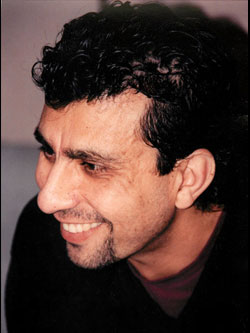To many outsiders who don't understand the region, the Middle East is a monolith centered around a homogenous Islamic culture. But to those living there, and particularly in cosmopolitan Lebanon, the region's rich and diverse history makes for a plethora of minority groups whose struggle for identity has deeply influenced historical and contemporary Middle East politics, a visiting professor told a Duke audience last week.

Speaking on "Phoenician, Lebanese or Arab: Crafting a Christian Identity in the Middle East" at the John Hope Franklin Center, North Carolina State history professor Akram Khater focused on his native Lebanon and how the many shades of religious, ethnic and civic identity there affected the country's history and its 1975 civil war and today continue to shape the current uprisings in the region.
The Phoenician merchant identity, the primary focus of Khater's lecture, arose in Beirut in the late 19th century following archaeological discoveries of ancient Phoenician artifacts. Phoenicia was a Mediterranean civilization of maritime traders that flourished from 1500 BC to 300 BC. Lebanese Christian scholars soon began to correlate the archaeological findings with their own ancestries and claimed to be the "heirs to the Phoenician nation."
By the 1950s and 1960s, partly because of this obsession with Phoenicia, predominantly Christian Beirut had become the commercial capital of the Middle East. But as Beirut grew wealthier from finance and international trade, the Muslim-majority agricultural settlements outside the capital slipped deeper into poverty because of a lack of government investment in those parts of Lebanon. The tensions between Muslims and Christians eventually reached a boiling point with the 1975 Civil War.
"The rest of Lebanon was suffering because of this Christian-Phoenician identity," Khater said. "There was a lot of resentment."
According to Khater, the conflict was rooted in Lebanon's disparate ethnic and religious identities, a problem that continues to influence Middle East politics and culture.
"The problem we see today with the Arab Spring is the relationship between sect, ethnicity, and the nation," Khater said. "Thus, the notion of a nation-state [or a country governed by one ethnic or religious group] in the Middle East is itself a crisis."
Duke religious studies professor Lucas Van Rompay, who helped organize the talk, said the history of identity among Middle Eastern minorities is especially relevant today.
"Even if the Middle East is in the news every day, it's still so rare to hear about religious minorities," Van Rompay said. "It's important to have some knowledge of the diversity of this region."
Lecture attendee Kelly Jarrett, who directs the Middle East in Global Contexts FOCUS cluster for first-year students, said Khater's lecture is one of many that the students enrolled in the cluster were encouraged to attend.
"We try to have students make connections between what they learn in class and everything else going on in the world," Jarrett said. "It's important to understand the complexities and the diversity of identity that exists in the Middle East. The more you understand about the richness of a place, the more you understand what goes on there."
Click here for a list of fall 2012 events sponsored by Duke University Middle East Studies Center and Duke Islamic Studies Center.